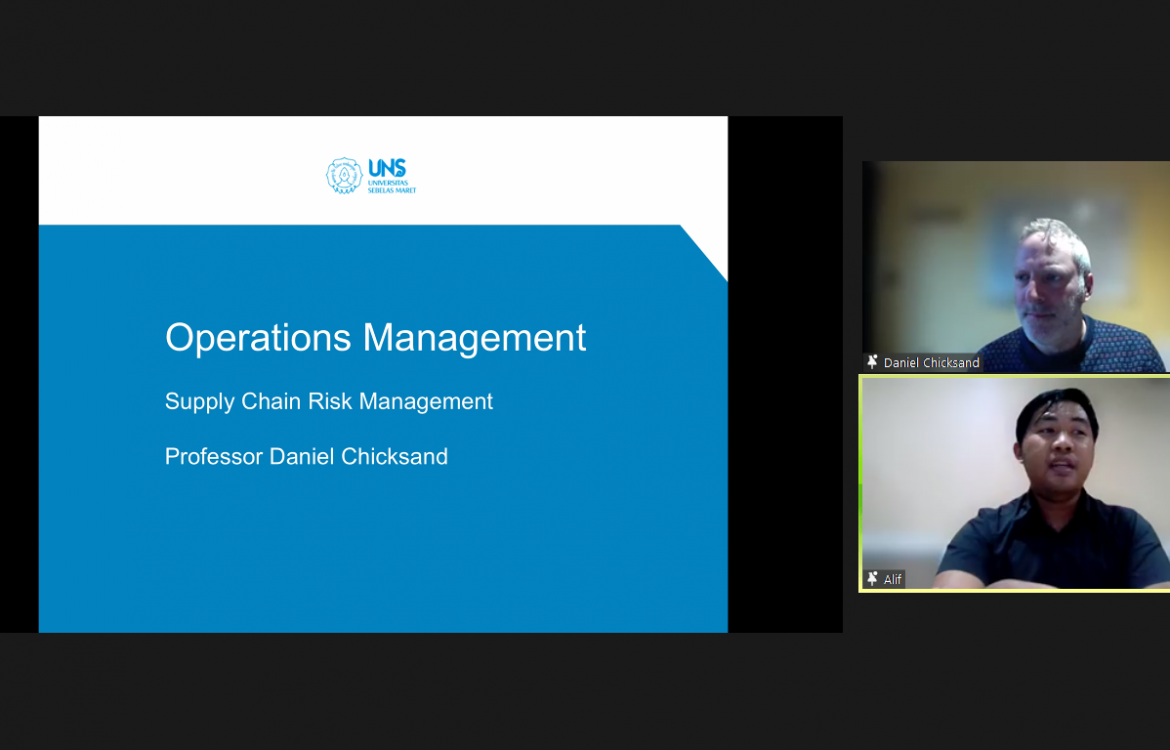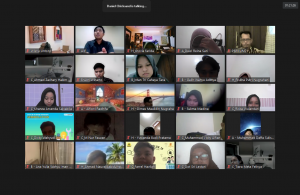
Inviting Prof. Daniel Chicksand in Guest Lecture A Practical Approach to Supply Chain Management Risk, Management Study Program Hosted Another PKKM Guest Lecture
The Bachelor of Management Study Program hosted another Guest Lecture as part of the Visiting Professor Series under the Kompetisi Kampus Merdeka Program (PKKM) 2022. The agenda as part of the visiting lecture series for Supply Chain Management is entitled ‘Guest Lecture: A Practical Approach to Supply Chain Management Risk,’ inviting Prof. Daniel Chicksand from Birmingham Business School, UK. The virtual event was conducted through the Zoom Cloud Meeting and led by Miftachul Ma’arif, SEI., MM, a lecturer of the Management Study Program FEB UNS, as the moderator of the discussion.
 The guest lecture conducted on Wednesday, November 30th, 2022, was attended by more than 100 participants consisting of FEB UNS students and lecturers.
The guest lecture conducted on Wednesday, November 30th, 2022, was attended by more than 100 participants consisting of FEB UNS students and lecturers.
Opening the material presentation, Prof. Chicksand introduces the concept of risk to the attending participants. “Risk is a latent potential for gain or loss, where the potential will not materialize except a specific occurrence initiated the risk. Therefore, it can be concluded that risk will remain as potential if the causal event does not occur,” explains Prof. Chicksand.
Starting from this definition, Prof. Chicksand pointed out three criteria of risk, namely the existence of potential, the said risk is latent, and after it materializes, the effect can be measured quantitatively.
Related to the risk faced by a corporation, managers should identify the existing risk potential, understand the effect of each risk, and predict the probability of each risk. “Risk is natural and exists everywhere, even if their effect is small or low. Each manager also has their own preference for risk-taking activity. Therefore, the decision taken to handle certain types of risk may differ from one another,” reveals Prof. Chicksand.
 Following the extensive introduction to risk, Prof. Chicksand further explains risk management in the supply chain sector. Regarding mitigation according to the type of risk and probability, Prof. Chicksand mentioned four options available, among others, reduce, avoid, retain, and transfer.
Following the extensive introduction to risk, Prof. Chicksand further explains risk management in the supply chain sector. Regarding mitigation according to the type of risk and probability, Prof. Chicksand mentioned four options available, among others, reduce, avoid, retain, and transfer.
“When a risk has a huge effect and high probability, it is better for a manager to avoid the said risk by implementing various strategies. If the risk has a huge effect but has a low probability, managers can apply the transfer technique, to transfer the risk to other parties, such as insurance companies. Meanwhile, if a risk has a small effect, a manager can apply both retain or reduce method,” explains Prof. Chicksand.

